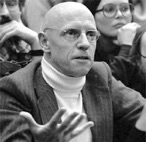PHIL 407/ 507 - Biopower:
Michel Foucault & Beyond




Schedule: Lecture/ Seminar 407/507 - Monday & Wednesday 16:00-17:50 (204 CHA)
Office Hours: Any time - mainly, by appointment.
Required Books:
> Thomas Lemke, Bio-Politics An Advanced Introduction, (NYU Press, 2011)
> Biopolitics: A Reader, Timothy Campbell & Adam Sitze (editors), (Duke UP, 2013)
> Other Required Readings that will be posted on LORE
Final papers are due by 5pm on December 9th. A hard copy should be dropped in my mailbox in the PHIL Dept. main office.
Syllabus (provisional): Available here.
This is a very dense & demanding syllabus, but in the end, as I hope, particularly rewarding.
Course Description:
In his 1976 volume of the History of Sexuality, called La Volonté de Savoir, Foucault famously wrote: “For millennia, man remained what he was for Aristotle: a living animal with the additional capacity for a political existence; modern man is an animal whose politics places his existence as a living being in question” (143). In this course, we will attempt to understand the significant consequences entailed by Foucault’s assessment of the ways in which a new relation between history and life emerges during the 19th century. Prior to modernity, life was understood as being outside history, driven by independent natural and environmental processes. The novelty of our modern time consists in bringing life into human historicity and in investigating, through techniques of knowledge and power, the human body, its modes of subsistence, and its entire living space.
In addition, an entire series of political mechanisms, with a regulatory function, emerge to control populations. Medical, administrative, and police apparatuses, all those technologies of power centered on life, create a new normalizing society whose role is no longer to take life or let live, but, on the contrary, to manage life. Thus, the regulation of sexuality and the emergence of genocides become the manifestation and the very paradox of this new form of power (biopouvoir). These are the two poles of biopower: one, centered on the body as machine, the anatomo-politics of the human body; and the other, focused on the species body, along with its whole set of biological processes: a biopolitics of the population.
Since Foucault’s La Volonté de Savoir, the notion of biopower has evolved and changed in order to accommodate new political objects (race, reproduction, genomic medicine). This course will not only unveil new developments concerning biopower (Agamben, Negri, Rabinow, Rose, Esposito, Rancière, Latour), but will also peruse the intellectual space that functioned as a condition of possibility for such a new form of power (Edouard Toulouse, Hacking).
Announcements and Other Stuff:
1. Important Event at UC Berkley - Neoliberalism and Biopolitics Working Group:
Revisiting Foucault: The Biopolitics Lectures & Beyond
with Hans Sluga, William and Trudy Ausfahl Professor of Philosophy, UC Berkeley
17 September, 2014, 5:00 pm - 7:00 pm
3335 Dwinelle Hall, UC Berkeley
-
2.RFID Tags, Informatized Subjects and Biopolitics by Gordon Hull.
(interesting post on New APPS, especially for our week 10).




